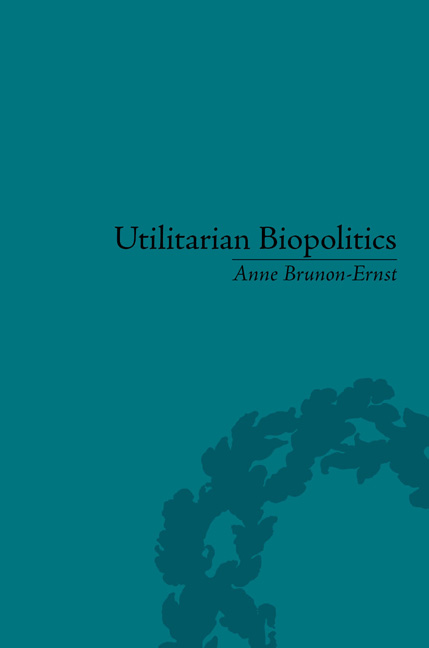Book contents
- Frontmatter
- CONTENTS
- Acknowledgements
- General Introduction
- Part I Biopolitics of Interests Introduction: From Interest to Norms
- 1 Biopolitical Pleasure
- 2 Biopolitical Pain
- Part II Utilitarian Conduct of Conduct Introduction: Legal Norms, Extra-Legal Norms and Utilitarian Conduct
- Part III The Biopolitical Expert Introduction: The Moralist and the Economist
- Epilogue: (De)Constructing Biopolitics
- Notes
- Works Cited
- Index
2 - Biopolitical Pain
from Part I - Biopolitics of Interests Introduction: From Interest to Norms
- Frontmatter
- CONTENTS
- Acknowledgements
- General Introduction
- Part I Biopolitics of Interests Introduction: From Interest to Norms
- 1 Biopolitical Pleasure
- 2 Biopolitical Pain
- Part II Utilitarian Conduct of Conduct Introduction: Legal Norms, Extra-Legal Norms and Utilitarian Conduct
- Part III The Biopolitical Expert Introduction: The Moralist and the Economist
- Epilogue: (De)Constructing Biopolitics
- Notes
- Works Cited
- Index
Summary
The notion of instinct enables the legal scandal of a crime without interest or motive, and consequently an unpunishable crime, to be reduced to intelligible terms.
Men calculate, some with less exactness, indeed, some with more: but all men calculate. I would not say, that even a madman does not calculate.
From Utilitarian to Biopolitical Pain
Pain in Foucault
Unlike pleasures, which were not defined but which constituted a pivotal concept in Foucault's theory on sex, pain is not paramount in Foucault's thought. It does, however, need to be analysed. Having said this, I should point out that I am excluding pain which arises from sadomasochist practice since this type of pain, which produces some form of pleasure, falls within the first category of pleasures developped in the previous chapter. Foucault was interested in a wide range of pains: the pain caused by illness and the ways in which the medical professions accounted for this it; the pain produced by religious rule and asceticism; and the pain inflicted by public opinion on those who deviated from an established norm, especially in respect to nineteenth-century perverts. However, my discussion will mainly centre on two types of pain which I will not necessarily distinguish. The first is the pain produced by the commission of an offence on the victims, their relatives and the community as a whole.
- Type
- Chapter
- Information
- Utilitarian BiopoliticsBentham, Foucault and Modern Power, pp. 31 - 48Publisher: Pickering & ChattoFirst published in: 2014

